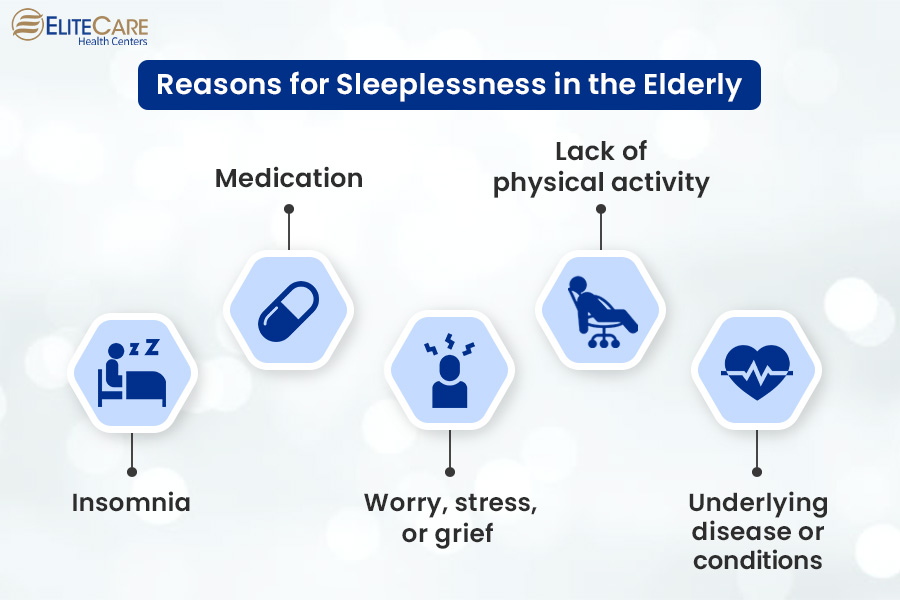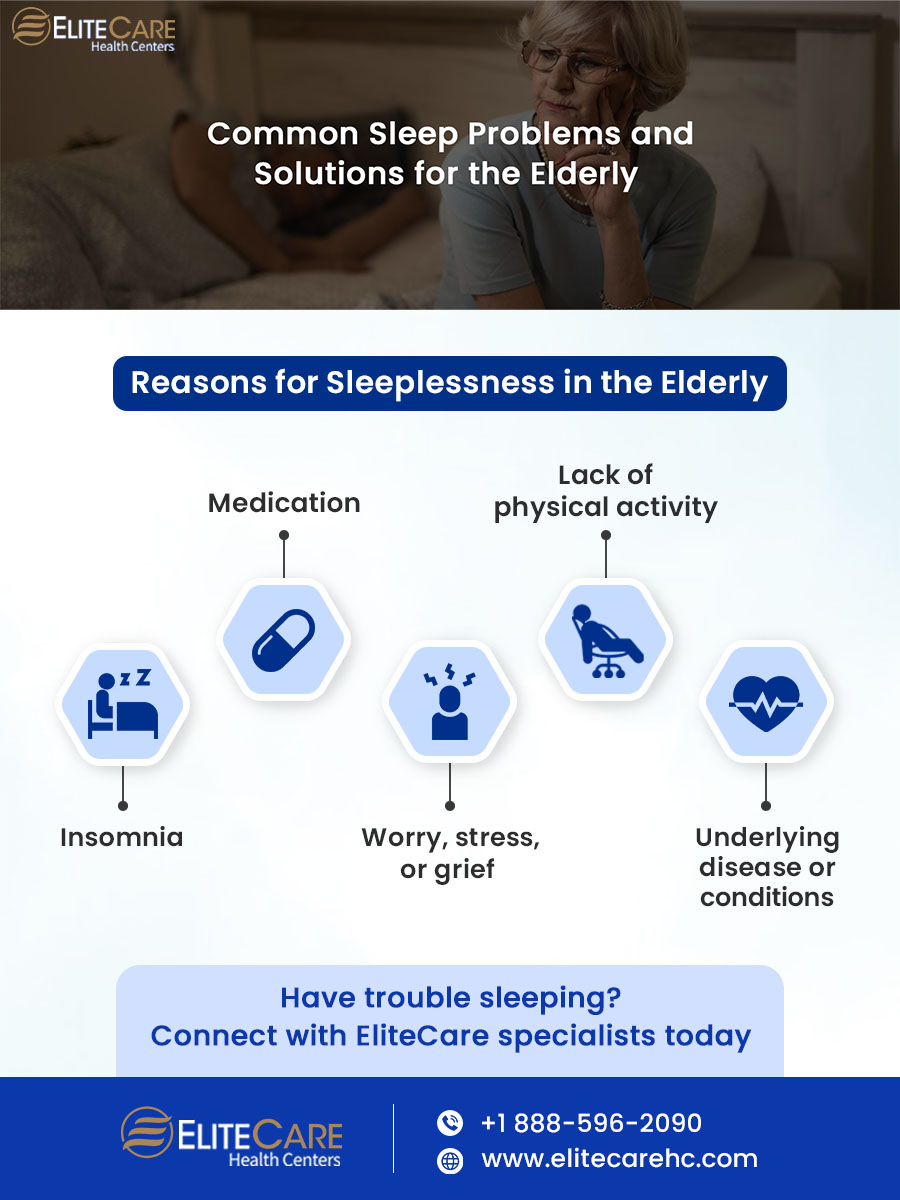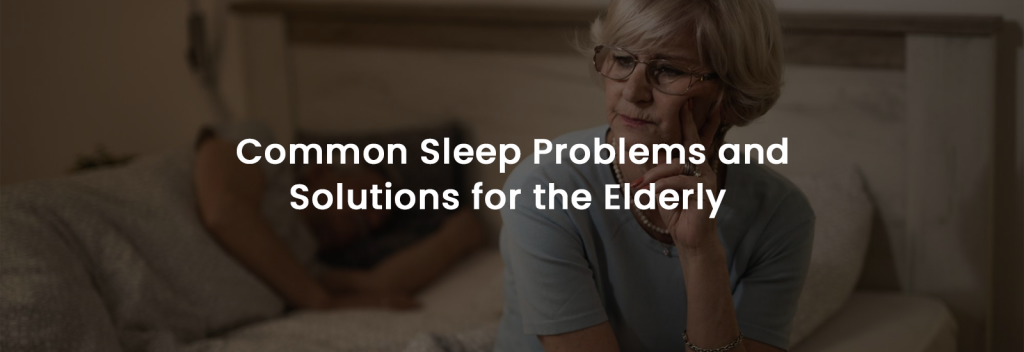
Seniors have trouble falling asleep, spend less time in the deeper stages of sleep, get up earlier in the morning, and get less overall sleep. These sleep issues are one of many health issues associated with aging. Inadequate sleep can aggravate several existing conditions like diabetes, cardiovascular disease, and more.
Understanding how aging and sleep interact is essential in improving health. Insufficient sleep in the elderly increases their risk of depression, concentration, memory issues, and overnight falls. Become familiar with various sleep issues and how to resolve them.
Sleep Problems in the Elderly and How to Deal with Them

Poor sleep habits
Unreliable sleep-wake cycles can interfere with a person’s circadian rhythm and make it difficult to keep to a regular schedule. Alcohol, caffeine, and some medications can all disrupt sleep. Therefore, it is critical to check for poor sleeping patterns and other potential concerns in the elderly.
Seniors who struggle with sleep issues can change their behavior patterns by:
- Maintaining a regular bedtime
- Creating pre-sleep rituals
- Engaging in regular exercise
- Abstain from coffee, smoking, and alcohol before bed
Read More: Seniors: Are you drinking enough water?
Medications
Nearly 40% of adults over 65 take five or more prescription drugs. These medications may make it difficult for elders to fall asleep. Examples include Alzheimer’s drugs, beta-blockers, antidepressants, thyroid supplements, and steroids. Medications should not be stopped without the doctor’s consent if a senior is experiencing sleep problems due to them.
- Doctors may change the medicine or alter the dosage when notified of the problem.
- The doctor might advise a prescription sleeping pill or a natural sleep aid like melatonin.
Read More: The Most Common Health Concerns for Seniors – Part 1
Worry, stress, or grief
Some elders deal with psychological issues or mental conditions that impact both the quantity and quality of their sleep. Depression is common in older people but not a normal part of aging. In addition, life changes like a loved one’s passing, leaving the family home, and physical limitations brought on by disease can impact sleep.
Seniors can try the following activities to overcome stress:
- Keep a journal
- Listen to relaxing music
- Enjoy a good book
- Ask a partner or a friend for a massage
- Practice relaxation techniques before sleep
- Look for occasions during the day to discuss concerns with a friend in person
Sleep disorders
Aging is linked to sleep disorders such as sleep apnea, restless legs syndrome, periodic limb movement disorder, and REM behavior disorder. These ailments can all have an impact on sleep cycle stages. The likelihood of developing sleep apnea rises with age (especially in women), and it has effects on the heart and brain in addition to disrupting sleep.
Sleep disorders in the elderly are best managed by:
- Aerobic exercise (regular cardiovascular activity improves sleep quality)
- Morning and early evening exercises encourage deep sleep and enhance sleep quality
- Keep the bedroom silent and dark
Underlying disease or conditions
Medical illnesses such as overnight heartburn, frequent urination, pain, arthritis, asthma, diabetes, osteoporosis, and Alzheimer’s disease may cause sleep disturbances. Many older women experience hot flashes and night sweats, making it difficult to fall asleep during menopause.
- Increase melatonin levels naturally by switching to low-wattage lighting.
- Avoid reading at night from a backlit device (iPad).
- Avoid working, watching TV, or using the computer in bed
Tests and Exams to Detect Sleep Disorders
To diagnose sleep disorders, various tests and exams are available. Here are some commonly used methods:
- Polysomnography (PSG): This comprehensive sleep study involves monitoring brain waves, eye movements, heart rate, muscle activity, and breathing patterns during sleep. It helps diagnose conditions like sleep apnea, narcolepsy, and restless leg syndrome.
- Multiple Sleep Latency Test (MSLT): This test measures daytime sleepiness and helps diagnose disorders like narcolepsy. It involves a series of naps throughout the day, with monitoring of sleep onset and REM sleep.
- Maintenance of Wakefulness Test (MWT): This test evaluates a person’s ability to stay awake during the day and is used to diagnose excessive daytime sleepiness.
- Actigraphy: This involves wearing a small device on the wrist that records movement patterns. It helps assess sleep-wake patterns and circadian rhythm disorders.
- Sleep questionnaires and diaries: These tools gather subjective information about sleep habits, symptoms, and patterns from the individual or their bed partner. They provide valuable insights for diagnosing sleep disorders.
It’s important to consult with a healthcare professional who specializes in sleep medicine to determine the appropriate tests based on the specific symptoms and suspected sleep disorder.
Conclusion
Sleep requirements vary from person to person. However, if sleeplessness interferes with everyday activities, consider looking into the source of the issue and taking action to improve sleep.
According to studies, approximately 40% and 70% of older adults have chronic sleep issues and up to half of those cases are probably undiagnosed. Therefore, it is crucial to raise awareness about this issue and take effective measures to resolve it. Keep a sleep journal and show it to the physician. Record your alcohol, caffeine, and nicotine intake on paper, and keep a record of prescription drugs, physical activity, lifestyle adjustments, and recent stressful events. Primary care physicians may suggest additional treatment from a sleep expert. Visit a healthcare center for complete analysis and accurate diagnosis. Contact EliteCare Health Centers, one of the best medical clinics in Florida, offering a wide range of senior care services.






